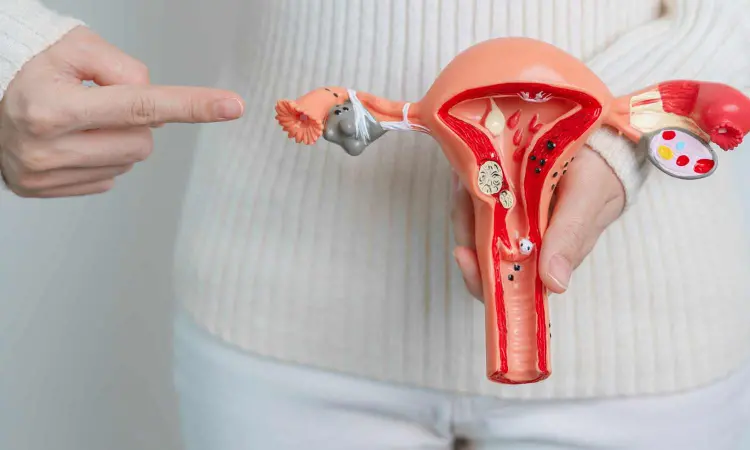- Home
- Medical news & Guidelines
- Anesthesiology
- Cardiology and CTVS
- Critical Care
- Dentistry
- Dermatology
- Diabetes and Endocrinology
- ENT
- Gastroenterology
- Medicine
- Nephrology
- Neurology
- Obstretics-Gynaecology
- Oncology
- Ophthalmology
- Orthopaedics
- Pediatrics-Neonatology
- Psychiatry
- Pulmonology
- Radiology
- Surgery
- Urology
- Laboratory Medicine
- Diet
- Nursing
- Paramedical
- Physiotherapy
- Health news
- Fact Check
- Bone Health Fact Check
- Brain Health Fact Check
- Cancer Related Fact Check
- Child Care Fact Check
- Dental and oral health fact check
- Diabetes and metabolic health fact check
- Diet and Nutrition Fact Check
- Eye and ENT Care Fact Check
- Fitness fact check
- Gut health fact check
- Heart health fact check
- Kidney health fact check
- Medical education fact check
- Men's health fact check
- Respiratory fact check
- Skin and hair care fact check
- Vaccine and Immunization fact check
- Women's health fact check
- AYUSH
- State News
- Andaman and Nicobar Islands
- Andhra Pradesh
- Arunachal Pradesh
- Assam
- Bihar
- Chandigarh
- Chattisgarh
- Dadra and Nagar Haveli
- Daman and Diu
- Delhi
- Goa
- Gujarat
- Haryana
- Himachal Pradesh
- Jammu & Kashmir
- Jharkhand
- Karnataka
- Kerala
- Ladakh
- Lakshadweep
- Madhya Pradesh
- Maharashtra
- Manipur
- Meghalaya
- Mizoram
- Nagaland
- Odisha
- Puducherry
- Punjab
- Rajasthan
- Sikkim
- Tamil Nadu
- Telangana
- Tripura
- Uttar Pradesh
- Uttrakhand
- West Bengal
- Medical Education
- Industry
Low Vitamin D3 and High Prolactin Linked to Increased Uterine Fibroids in Premenopausal Women: Indian Study

India: A new study published in the Indian Journal of Medical Sciences sheds light on the hormonal imbalances potentially influencing the growth and progression of uterine fibroids (UFs) in premenopausal women. Conducted by Dr. Azaz Ahmad and colleagues from the Department of Reproductive Medicine, Indira IVF Hospital Pvt. Ltd., Udaipur, India, the research explored the correlation between serum vitamin D3 and prolactin (PRL) levels in women diagnosed with uterine fibroids.
"Indian study found that premenopausal women with uterine fibroids had much lower vitamin D3 levels (10.85 ng/mL) and higher prolactin levels (27.79 ng/mL) compared to healthy women (19.64 and 13.96 ng/mL, respectively). Lower vitamin D3 was linked to more fibroids, while higher prolactin levels were also associated with an increased number of fibroids, suggesting both may play a role in fibroid development," the researchers reported.
Uterine fibroids, also known as leiomyomas, are non-cancerous tumors commonly seen in women of reproductive age, with prevalence rates nearing 70%. Despite being benign, these growths can lead to a range of reproductive and gynecological issues, including infertility, pelvic pain, and heavy menstrual bleeding. Emerging evidence points to the role of vitamin D deficiency and elevated prolactin levels in the development and exacerbation of these tumors.
In this cross-sectional study conducted between April and November 2022, researchers compared 80 premenopausal women with uterine fibroids (≥2 cm in size) with 80 healthy women. All participants were evaluated using transvaginal ultrasound and underwent blood tests to measure serum levels of vitamin D3 and prolactin.
Based on the study, researchers reported the following findings:
- Women with fibroids had significantly lower serum vitamin D3 levels (10.85 ± 3.34 ng/mL) compared to healthy controls (19.64 ± 5.50 ng/mL).
- Prolactin levels were significantly higher in the fibroid group (27.79 ± 8.19 ng/mL) than in the control group (13.96 ± 4.09 ng/mL).
- Both differences in vitamin D3 and prolactin levels between groups were statistically significant.
- Serum vitamin D3 levels showed a moderate negative correlation with the number of fibroids (r = −0.513), indicating that lower vitamin D3 levels were linked to a higher number of fibroids.
- Serum prolactin levels exhibited a positive correlation with fibroid number (r = 0.453), suggesting that higher prolactin levels were associated with a greater fibroid burden.
These findings highlight the potential role of vitamin D3 deficiency and elevated prolactin as contributing factors in fibroid development. The authors suggest that monitoring these serum levels could aid in early detection and better management of uterine fibroids in premenopausal women.
"Given the clear associations observed, serum vitamin D3 and prolactin may serve as important biomarkers in the clinical evaluation of uterine fibroids," the researchers noted.
The study adds to growing evidence supporting the importance of hormonal and nutritional assessment in women with fibroids. It paves the way for future interventions aimed at correcting these imbalances to slow disease progression.
Reference:
Ahmad A, Ahmad M, Bhoi NR, Kumar M. Correlation between serum vitamin D3 and prolactin levels in premenopausal women with uterine fibroids. Indian J Med Sci. doi: 10.25259/IJMS_246_2024
Dr Kamal Kant Kohli-MBBS, DTCD- a chest specialist with more than 30 years of practice and a flair for writing clinical articles, Dr Kamal Kant Kohli joined Medical Dialogues as a Chief Editor of Medical News. Besides writing articles, as an editor, he proofreads and verifies all the medical content published on Medical Dialogues including those coming from journals, studies,medical conferences,guidelines etc. Email: drkohli@medicaldialogues.in. Contact no. 011-43720751


